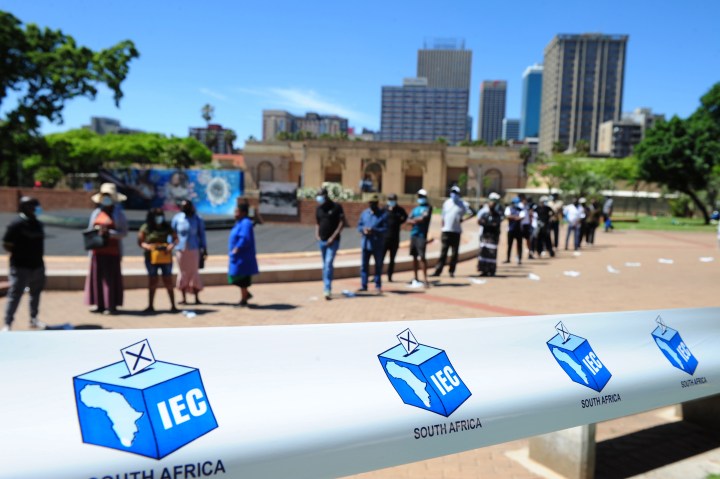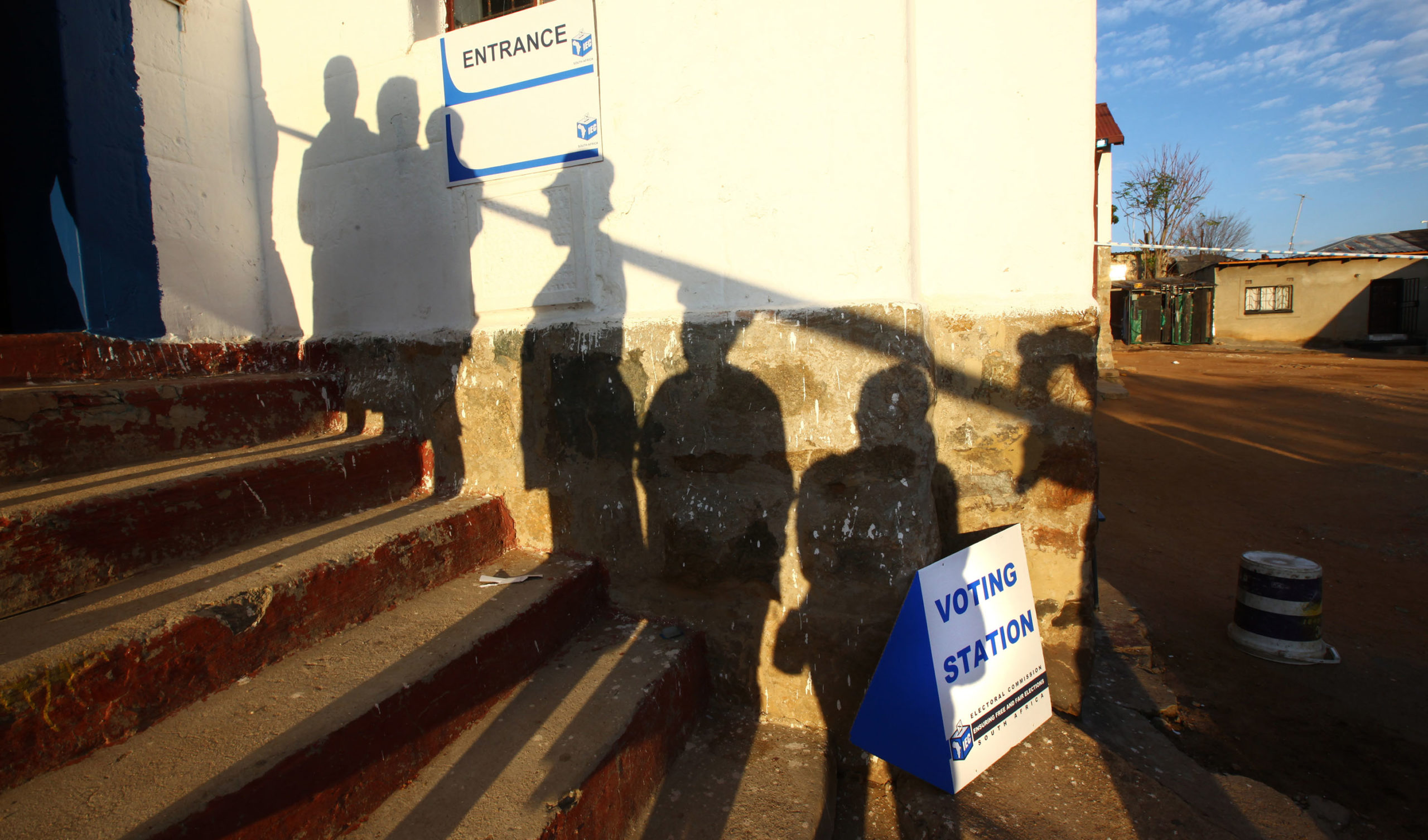ROAD TO 2024 ELECTIONS
‘Potential for political conflict high ahead of 2024 elections’, cautions Ebrahim Fakir

As the country gears towards the 2024 general elections, research suggests that the risk of political unrest may be high.
The warning comes as parliament is yet to finalise an important piece of legislation, the Electoral Amendment Bill, the deadline for which is now set for 10 December 2022.
Read more in Daily Maverick: NHI, Expropriation, Electoral and Traditional Courts bills near completion, whispers of legal challenges abound
Speaking at an Independent Electoral Commission (IEC) seminar held under the theme “Safeguarding electoral democracy in the age of growing mistrust” on Wednesday, Ebrahim Fakir of the Auwal Socio-Economic Research Institute called for the establishment of new systems.
“With a potentially new electoral system on the horizon for the 2024 election, the risk of unpreparedness and potential for precipitating political conflict are high, requiring the establishment of new administrative and management systems,” he said.
“The link between election integrity, institutional credibility and political violence, are not tenuous or fragile and isolated.”
Fakir’s research focused extensively on the decline of trust and credibility in the IEC and cause thereof, which some have linked to the consistent denigration by political party leaders and their supporters as well as social media users.

People queue in the early morning to vote in the 2011 local government elections at a church in Alexandra Township, Johannesburg. (Photo: EPA / Kim Ludbrook)
“In contra-distinction to the period coming into the 2021 local government elections, historically the IEC enjoyed unparalleled high levels of trust and confidence and a solid (even stellar) domestic and international reputation.
“The Independent Electoral Commission (IEC) has consistently received healthy approval ratings, with majority support from more than two-thirds (60%) of the adult population since 2021 till at least 2016, as shown by both the Human Sciences Research Council’s, South African Social Attitudes Survey (Sasas) and the Institute for Justice and Reconciliation (IJR) Afrobarometer.”
Meanwhile, the Human Sciences Research Council (HSRC) has found that political coercion had increased since 2009 to over a tenth. Research Direction at the HSRC Dr Ben Roberts said the coercion came mostly from family and friends.
“This needs to be monitored in coming elections,” said Roberts.
Historic low voter turnout
Another phenomenon which sought to be monitored ahead of the national elections, according to Roberts, had been the historic low voter turnout of 46.68% recorded nationally during the 2021 local government elections.
“The dynamics that contributed to the low turnout scenario seen in the 2021 local elections will become especially crucial for the 2024 elections and beyond.
Visit Daily Maverick’s home page for more news, analysis and investigations
“The debate needs to urgently turn to what needs to be done to move us from the current scenario, and restore the faith of the growing number of disaffected democrats in the country,” said Roberts.
This, according to Roberts, was of great importance, particularly for the country’s youth — many of whom are disengaging from voting.
Causes of credibility crisis
Fakir said the loss of trust and confidence in the IEC and government institutions signalled a major contagion effect.
“But there are also an increased number of court cases (including disputes, objections, and complaints). Increased accusations of maladministration and allegations of irregularities against electoral officials from voting stations level up towards provincial and national head office.”
Worryingly, the Afrobarometer statistics show that by 2021 only about one in three citizens (36%) trusted the Electoral Commission of South Africa.
While 38% trusted the president, 28% trusted Parliament, 27% said they trusted the ruling party and only 24% said they trusted opposition parties.
Meanwhile, research by the HSRC suggested the contrary.
“An overwhelming majority of voters 92% felt that the election procedures were free. A further 3% said they were free with minor problems and 2% said they were not at all free
The HSRC statistics also placed the IEC as the second most trusted public institution, with the courts being first. The commission’s CEO Sy Mamabolo welcomed the findings.
“The Commission will harness the positive elements arising from these longitudinal surveys while working with all the actors in the political system to address the negative perceptions about electoral democracy. Furthermore, identified challenges which are within the remit of the Commission will be factored into the electoral programme ahead of the 2024 elections,” said Mamabolo.
Contextualising issues
Fakir said there had been real and serious problems in politics, democratic politics and electoral democracy in the country, this as he made reference to the Afrobarometer 2021 survey which found that two-thirds (67%) of South Africans would be willing to give up elections if a non-elected government could provide security, housing and jobs.
He remarked that elections frequently signalled renewal and hope, or at least an opportunity for it, but with SA elections, this had not been the case.
“Since 2019 there is a distinct sense that many citizens did not view the elections as such. Instead, it was accompanied by an air of despondency, characterised by institutional mistrust, social polarisation, economic decline, niggardliness, welfare expansionism and organisational (party) attrition and fragmentation in both the ANC and the DA.
“Parties are viewed as insular, parochial and self-interested, leading to constantly shifting alliances within (factionalism), and between political parties (minority governments and coalitions),” said Fakir.
Heading into 2024, he argues that there is a need for parties to change their orientation to being competitive contestants rather than combative and conflictual. DM





















 Become an Insider
Become an Insider
I think the analysis of Ebrahim Fakir is far fetched that elections could spark unrest. South Africans hate violence and anarchy. It is a country that eschews violence for politics. The failure of the insurrection was not because of government but despite government inaction and thuggery of Cele, South Africans came to the defence of their country. What one cannot discount is the unrest because of service delivery in particular the electricity crisis, water and the sewage running into streets. The e – tolls were roundly rejected without violence and for the first time people refused to pay. Violence even in the service delivery will come from the non – violent protest. I say this with authority and experience not as an arm chair or gucci revolutionary. The ANC has virtually lost Gauteng and those is nobody urging a revolution or an uprising for that. You will need to energise the non – voting public to register and vote and show them that their vote counts. The IEC Chairperson accompanied the ANC President to the polls in 2019 which is very wrong and last year he got a judge to write a political legal opinion to postpone elections in violation of the Constitution and in my book he is not a fit and proper person to be at the helm of the IEC.